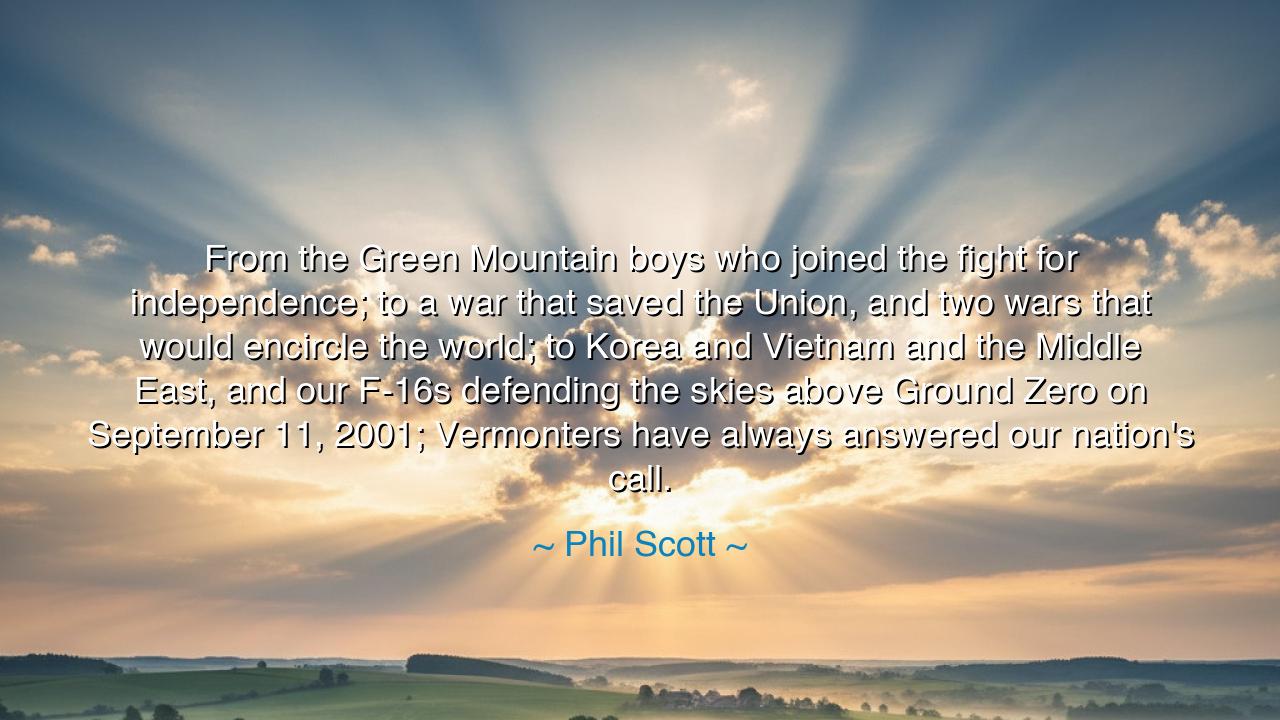
From the Green Mountain boys who joined the fight for
From the Green Mountain boys who joined the fight for independence; to a war that saved the Union, and two wars that would encircle the world; to Korea and Vietnam and the Middle East, and our F-16s defending the skies above Ground Zero on September 11, 2001; Vermonters have always answered our nation's call.






“From the Green Mountain Boys who joined the fight for independence; to a war that saved the Union, and two wars that would encircle the world; to Korea and Vietnam and the Middle East, and our F-16s defending the skies above Ground Zero on September 11, 2001; Vermonters have always answered our nation's call.” So spoke Phil Scott, the governor of Vermont, invoking the long and noble lineage of courage that runs through the veins of his people. In these words, he does more than recount the deeds of soldiers — he summons the living spirit of duty, sacrifice, and patriotism that has bound generation to generation. His voice becomes the echo of an ancient truth: that freedom endures not through comfort, but through those who rise when their country calls.
To understand this saying is to understand the soul of Vermont — that rugged cradle of independence, where the wind on the mountains still carries the whisper of the Green Mountain Boys. In the days of the Revolution, when tyranny darkened the land, these men — farmers, blacksmiths, and settlers — rose from their homesteads to fight beneath the banner of liberty. Led by Ethan Allen, they seized Fort Ticonderoga and gave the fledgling colonies their first great victory. From that humble fortress flowed the cannons that defended Boston and inspired hope throughout the land. Thus, the legacy of Vermont began not in wealth or power, but in courage — in the unyielding belief that an ordinary man, if his cause be just, can stand against empires.
But Governor Scott’s words reach beyond one age, for they trace a river of valor through the centuries. The war that saved the Union called forth a new generation of Vermonters who took up arms not for conquest, but for the preservation of a dream — that all men might remain free and equal beneath one flag. Their blood mingled with that of brothers from every state upon the battlefields of Gettysburg, Antietam, and Cold Harbor, where courage was tested and the very soul of America hung in the balance. When the smoke cleared, the Union stood, and the Green Mountain spirit endured — tempered by sorrow, yet unbroken in will.
Then came the great storms of the twentieth century — the wars that encircled the world. Vermonters crossed oceans and continents to defend not just their own homes, but the hope of mankind. They stormed the beaches of Normandy, flew through the smoke above Berlin, and fought in the jungles of the Pacific. In each battle, they carried the quiet determination of their forebears — the conviction that freedom, though costly, must never be surrendered. When the guns fell silent, they returned not to glory, but to the steady work of peace, rebuilding farms, towns, and families, knowing that service is not an act but a way of life.
The call came again in the cold mountains of Korea, the dense jungles of Vietnam, and the burning sands of the Middle East. In each age, Vermonters — and through them, Americans — answered with courage. They did not fight for conquest or gain, but for the preservation of liberty, justice, and the safety of those who could not defend themselves. And in the dark hour of September 11, 2001, when terror sought to wound the heart of the nation, Vermonters once again took to the skies. Their F-16s guarded the trembling air above Ground Zero, their courage a shield for a nation in mourning. In that moment, the legacy of the Green Mountain Boys lived anew — the same flame, burning across the centuries, defying fear and despair.
What Phil Scott reminds us, then, is not merely the history of a single state, but the enduring rhythm of the American spirit: that every generation is called, in its own way, to defend what is good and right. Some are called to battle; others to build, to heal, to teach, to serve. Yet the essence is the same — the willingness to give of oneself for something greater. The call of the nation is not only to arms, but to purpose — to rise when others fall, to speak when others are silent, to act when others wait.
Let the lesson be this: never forget the lineage of courage you inherit. Whether you wield a plow, a pen, or a sword, you bear within you the same spark that moved the Green Mountain Boys and every soul who answered the call of duty. Guard it. Nurture it. And when your time comes — when the world needs your hands, your heart, your strength — rise as they did, unflinching. For the defense of one’s people is not a burden; it is an honor.
So remember, my child of freedom’s dawn: the cost of liberty is eternal vigilance, and its reward is the life of the free. As Phil Scott declared, the call of the nation still echoes, and it waits for hearts brave enough to answer. When you hear it — whether on the field of war or in the quiet service of peace — do not turn away. Stand tall, as your ancestors did, and let history remember that you, too, were among those who answered the call.






AAdministratorAdministrator
Welcome, honored guests. Please leave a comment, we will respond soon